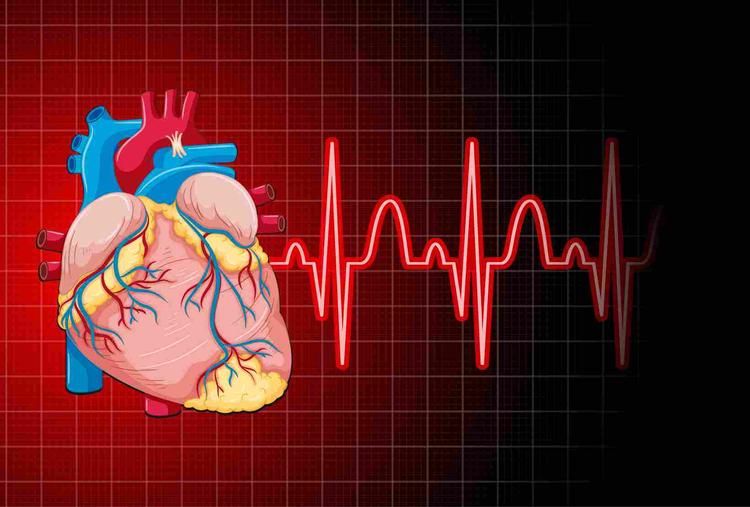Congestive Heart Failure - Its symptoms & Causes, Test and Diagnosis

Medically Reviewed By
Dr. Ragiinii Sharma
Written By Prekshi Garg
on Dec 28, 2022
Last Edit Made By Prekshi Garg
on Mar 17, 2024

CHF, or congestive heart failure, is a medical term that describes a patient whose heart does not work correctly or does not pump enough blood to meet the body's requirement for energy. The reason behind this condition can be either a heart that pumps well but is insufficient due to structural problems or a weak heart muscle that cannot pump the required amount of blood. It is a chronic progressive condition that affects the pumping power of the heart muscles and often refers to heart failure. Generally, a person has four heart chambers: the upper half is made of two atria, and the lower half is made of the other two ventricles. These ventricles pump blood to your body's organs, and tissues and atria receive blood from the body as it circulates back from the rest. The CHF symptoms develop when a person's ventricles cannot pump enough blood volume to the body, and eventually, blood and other fluids back up inside your
- Abdomen
- Lungs
- Liver
- Lower body
Stages of congestive heart failure
There are many stages of heart failure. However, they depend on the symptoms the patient is experiencing. These stages with the linked symptoms are listed below. There are mainly four stages of congestive heart failure:
Stage 1
At the first stage, a person has not yet developed the condition but is more prone to one or more pre-existing conditions like high BP, diabetes, or coronary artery disease. A Person can experience some symptoms like
- Shortness of breath,
- difficulty in breathing
- Swelling in feet, hands, and ankles
Stage 2
In the Second stage, a person has still not shown symptoms of congestive heart failure but has received a systolic left ventricular dysfunction diagnosis. A person can experience some symptoms; however, most people do not show CHF symptoms at this stage.
Stage 3
In the third stage, a person has developed the signs of heart failure and, at present, has structural heart disease. Some common stage 3 symptoms are
- Shortness of breath.
- Feeling tired (fatigue).
- Less able to exercise.
- Weak legs.
- Waking up to urinate.
- Swollen feet, ankles, lower legs, and abdomen
Stage 4
A person in the fourth stage has advanced heart failure that is difficult to manage with standard treatment. Some symptoms are;
- Shortness of breath
- Difficulty breathing
- Swelling of arms, legs, ankles, and hands
- Fatigue
- Nausea
- Weight gain
- Rapid heartbeat
- Lightheadedness
- Cough
Symptoms of congestive heart failure
CHF can be life-threatening; at an early stage, a person will not experience any signs of congestive heart failure. The time your condition progresses, you may experience many changes and symptoms:
- Fatigue and weakness
- Shortness of breath
- Swelling in legs, feet, and ankles
- Irregular heartbeat
- Reduction in ability to do physical activity
- Swelling of the belly area
- Persistent cough
- Rapid weight gain
- Difficulty in concentrating
- Lack of appetite
- Chest pain
- Fainting
All of the above can be because of CHF; however, many other causes can also indicate other life-threatening heart and lung conditions. Visit your doctor if you experience any of the above signs of congestive heart failure.
Heart failures are very common nowadays, affecting a large population worldwide. It does not mean that your heart stopped working; instead, it means that the heart works less efficiently than it should. There can be many possible causes of the condition that damages the heart muscle. You may not have any CHF symptoms, or they can be constant or come and go. You need to visit your doctor if you experience some early signs of congestive heart failure, like rapid breathing, gasping breaths, and poor weight gain, to determine the cause and severity of the condition. Many options are available for treating congestive heart failure, as careful monitoring can help you treat and prevent the condition effectively.
Causes of congestive heart failure
Weakened heart muscles cause CHF, and when the heart becomes too stiff. The heart's pumping chambers may become stiff and not fill appropriately between the beats. In some cases, the heart muscle may become damaged, and the ventricles may stretch to the point that heat cannot pump blood-required blood through the body. With time the heart cannot fulfill the blood requirement of the overall body and starts showing CHF symptoms. Causes of sudden heart failure are
- Allergic reactions
- Any illness in the full body
- Blood clots in the lungs
- Severe infections
- Use of certain medicines
- Viruses that attack the heart muscle
Risk factors of congestive heart failure
If you have congestive heart failure, fluid will build around your heart and hamper your ability to pump blood correctly. You are at more risk if you have any of the below-listed conditions:
- Diabetes
- Obesity
- High blood pressure
- Heart attack
- Coronary artery disease
- Heart valve disease
- Irregular heartbeats
- Congenital heart disease
- Sleep apnea
- Viruses
- Smoking
- Alcohol abuse
- Age
- Gender
- Genetics/family history
- Ethnicity
Complications related to congestive heart failure
If the sign of congestive heart failure is left untreated, then it can cause additional complications for the patients that are listed below:
- Renal damage
Heart failure causes a reduction in blood flow, which can lead to a reduction in blood flow to the kidneys, and it ultimately affects the body's filtering system. This results in a buildup of toxins within the body, and if renal damage becomes severe, patients can require dialysis.
- Heart valve disease
The heart valves help to prevent blood from back flowing in the heart, and if the heart does not function properly, the muscle becomes stiff, and pressure increases within the heart. It will lead to cause if dysfunctioning of the valves also.
- Cardiac arrhythmias
A reduction in heart functioning will increase the chances that patients may experience other cardiac-related issues, some of which can be fatal.
- Liver damage
If congestive heart failure is left untreated, it leads to a backup of fluid and ultimately puts pressure on the liver causing liver dysfunction and damage.
Diagnosis and test for congestive heart failure
Diagnosis of congestive heart failure is done carefully by a doctor after checking your medical history, taking a review of your CHF symptoms, and performing a physical examination; a medical expert will check to see if you have risk factors of developing the condition like high BP, diabetes, coronary heart disease, etc. A doctor will listen to your lungs to check the signs of lung congestion and has to check the murmurs that indicate heart failure. They may also check the veins in your neck and fluid buildup in your legs and abdomen. Doctors recommend many congestive heart failure tests to check your condition:
- Blood tests are done to look for symptoms of congestive heart failure affecting the heart.
- A chest X-ray is done to check the condition of the lungs and heart.
- An electrocardiogram is done to get the records of electrical signals in the heart and can show the length and timings of the heartbeats.
- The echocardiogram is a test done using sound waves to produce images of the heart in motion; the test shows the size and structure of the heart and heart valves and also tells about the blood flow through the heart.
- The doctor does a stress test to measure the heart's health during an activity, and for this, you may be asked to take a walk on a treadmill while attached to an ECG machine.
- CT scan is done by lying on the table inside a doughnut-shaped machine. It is done to collect images of the heart and chest.
- MRI uses radio waves to create an image of the heart.
- A coronary angiogram is a test by inserting a thin, flexible tube into a blood vessel, generally in the groin, and guided to heart arteries. A dye is injected to make the arteries show up more clearly to help doctors check the blockages.
The results of all types of congestive heart failure tests listed above help doctors to determine the cause of the symptoms and decide the appropriate treatment plan. Many nursing care plan goals are available for patients with congestive heart failure, including support to improve heart pump function through various nursing interventions, prevention, and checking on complications. It also includes offering a teaching plan for lifestyle alterations. Congestive heart failure nursing diagnosis also includes promoting activity and reducing fatigue to relieve the signs of fluid overload.
What is the importance of ejection fraction?
Ejection fraction is one of the ways to measure the severity of the heart-related condition; if the reports are below normal, then that means you might have heart failure. Your reports will tell the doctor how your left or right ventricle is functioning and pumping blood. Usually, EF, also known as congestive heart failure nursing diagnosis, usually determines how much blood is pumped your left ventricle is pumping because it is your heart's main chamber. Ejection fraction can be measured with many non-invasive tests that help your doctor decide how to treat you or determine whether the treatment is working. An ejection fraction is a percentage that measures your heart function:
- EF of 55 to 70 percent is normal.
- EF of 40 to 54 percent is slightly below normal and may not show symptoms
- EF of 35 to 39 percent is considered mild heart failure
- EF of less than 35 percent is moderate to severe heart failure.
Treatment of congestive heart failure
With the help of tests to determine the cause of CHF, a doctor will find the best treatment for you. Treatment of congestive heart failure may vary with the type of disease and age. A doctor will prescribe some medications or procedures for a treatable cause, like a rhythm problem. Small babies with ventricular septal effects require medical therapy that is a temporary solution to allow the hole to get smaller or close to its own and, if not a baby time little time to grow for heart surgery. For some more complex CHF conditions like truncus arteriosus or aortopulmonary window or more, after it is known, the doctor will recommend surgery when it is required. Some congenital heart conditions cannot undergo surgery, so a transplant is needed for that heart. For some people, congestive heart failure is a long-term condition that cannot be cured, but treatment can help to keep CHF symptoms under control, possibly for years; some main treatments are
- Medications
- Healthy lifestyle,
- Devices implanted in the chest to control the rhythm
- Surgery
Be Heart-Smart With Our Heart Day Special Package
Congestive heart failure is a heart condition that develops over time and can have multiple underlying causes. It is always possible to prevent diseases, but by being proactive and mindful of your dietary or lifestyle choices and considering routine Heart checkups, you can stay ahead of your heart health. Book our Heart Day Special Package - Essential/Advance or Comprehensive Package, each designed with different parameters to evaluate and determine heart-health risks. Indulging preventive checkups a part of your life will help with routine heart function assessments and detect early signs of heart dysfunction, allowing proactive intervention. So, delay no more and check your heart health with Redcliffe Labs today.
How to prevent congestive heart failure?
However, a person cannot control the risk factors of congestive heart failure like age, family history, etc. Still, lifestyle changes can offer you the best chance to prevent developing the condition. Things that you can do to prevent heart failure are easy and are listed below:
- Eating heart-healthy foods
- Maintaining a healthy weight,
- Exercising regularly
- Managing stress
- Avoiding tobacco use
- Avoiding alcohol
- Avoiding recreational drugs
- Taking care of other medical conditions like BP, diabetes, etc.
FAQs
What should you avoid if you have CHF?
Take care of your diet and avoid cured and processed meats, as they are high in sodium. Also, try to avoid burgers and steaks as they are high in types of fat that can lead to clogged arteries.
What are the common early signs of congestive heart failure?
Early signs of congestive heart failure are shortness of breath, fatigue, problem with rhythm, and fluid buildup.
What are the things that can worsen heart failure?
Many lifestyle factors can worsen your CHF and make you more prone to heart attack and stroke. Things that can worsen are smoking, being overweight, consuming foods high in fat and cholesterol, and not being physically active.
How long can a person live with congestive heart failure?
Treatments for congestive heart failure can help people manage the symptoms and slow the condition's progression.
Conclusion
The symptoms of congestive heart failure are subtle but should never be ignored as they can be dangerous. There is a general tendency of people to overlook some signs and attribute them to ageing. Thus all need to understand the condition well, as it can be life-threatening. Shortness of breath and fatigue are non-specific symptoms, but they can also be the primary signs of heart failure and heart attack. The time you notice these and seek treatments early is the key to staying healthy, as treating these can help you to keep them under control and prevent heart failure from progressing to a more advanced stage. If you are searching for a top pathology lab to get yourself tested, then book your appointment at Redcliffe labs. It offers a healthy heart package and many other tests at affordable rates and under which special discounts are also available.



